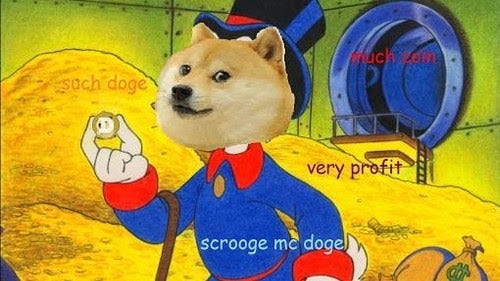The memes are in charge again.
Dogecoin was built tongue in cheek, it is bought as a joke, but now it is making people seriously rich. There’s a single wallet holding $25B in value as of today’s prices.
That should probably say “as of the exact second that I typed this sentence”. The price chart of DOGE is a stomach churning rollercoaster. There have been two drops of over 50% in the past month, and 20% intraday swings are regular.
The shiba-inu inspired digital asset was never meant to be serious. The name “doge” comes from an obscure Homestar Runner video, and the original website was built in Comic-Sans font. In the very nascent days of cryptocurrencies in 2013, the release was meant to be a light hearted jest at Bitcoin and came at a time of general skepticism of early protocols.
While the coin has seen its share of bubbles and mania in the past, nothing compares to the recent froth. Stories abound of people turning small bets into big fortunes. Established crypto on-ramps like Robinhood and Gemini are happy to take your dollars in exchange for DOGE.
There’s serious headline risk with Elon Musk - a vocal proponent of the coin - appearing on Saturday Night Live this weekend. I wouldn’t want to be short (or long?) DOGE going into that.
At the end of the day, it’s very unlikely that Dogecoin ever becomes “money” or even an “asset”, but it does prompt some questioning about what those words mean, and how we should think about this phenomenon.
Money is generally thought of as a store of value or a means of payment. Money is valuable because it commutes the efforts of our labor across time, and money works when people accept it for goods and services.
Down at the arcade, a few rounds of whack-a-mole or skeeball will produce a long string of red tickets. You can exchange those for a trinket - just don’t do the math on how much many quarters that stuffed animal really cost you. Maybe those tickets aren’t money, but what about a coupon for $5 off? What about a gift card? Are Robux money?
While DOGE might not be accepted at the corner store, neither is Apple or Microsoft stock. Of course we can quickly point to the employees, products, and revenue streams at those companies as examples for why those digital bites in our brokerage accounts actually have value. But it doesn’t answer the question of collective meaning.
At the end of the day, a big part of valuation comes down to faith. Faith that the sun will rise in the east, that tomorrow will bring new opportunities, and that the “thing” we as a society agreed on yesterday will still hold value tomorrow.
The daily fluctuations in the stock market are rarely about fundamental value. They’re ebbs and flows of money movements, and the magnitude or pace is more likely dictated by emotions or some non-economic reason. We sell because we’re scared, we buy because we’re greedy, and on summer Fridays the desk is empty in the afternoon.
What Dogecoin demonstrates is the speed and fervor with which narrative value can develop. The price goes up because more people think the price will go up. It’s fun to be a part of! How long can you hold on! (Disclosure - I have never held a DOGE position.)
It’s a digital merry-go-round that will spin until the next shiny object to capture the moment comes along. If you’re involved with that clear-eyed view, then I think it’s good for a laugh. If there was an even smaller allocation than “play money” this would be appropriate here.
It’s not much different than a lottery pool or Super Bowl squares. They can be fun, and they can bring people together. Whenever MegaMillions gets over a certain size, it’s fun to buy a ticket and dream of how you’d spend the money - that’s value in itself.
Dogecoin will eventually fizzle, maybe even by the time this post goes up. It’s certainly not the money or asset to put your savings into, but you can be excused for taking a light hearted pause and wanting to play with a furry puppy.





